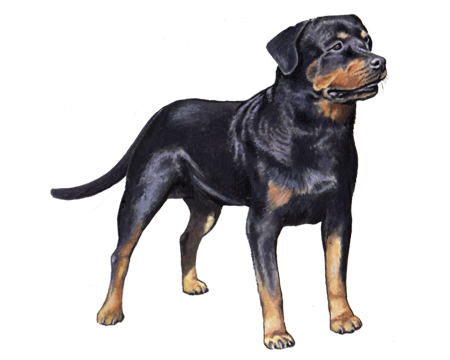
Cane Corso
Say "ciao" to one of the most valued dogs in Italy. The Cane Corso is an intelligent, easy-to-please canine. This even-tempered breed tends to be very loyal to its family and gentle with children. Highly trainable, Cane Corsos also make excellent guard dogs.
Interested in discovering if your dog is a Cane Corso?
Check out Wisdom Panel's DNA tests.

Cane Corso Traits
General Appearance
The handsome Cane Corso has a strong yet compact body with long and powerful muscles.
Coat and Colouring
The Cane Corso's short, coarse coat comes in black, gray, fawn, and red colors, as well as brindle variants. A black facial mask or small white patches across the coat are also possible.
Distinctive Physical Traits
Trademark features of the Cane Corso include a substantial head, bright eyes, and pronounced muscles.
Cane Corso Temperament
Cane Corsos make faithful, trustworthy members of the family. And they're usually good with children under careful supervision.
The breed, however, may not get along well with other dogs. Though not necessarily dog-aggressive, Cane Corsos may respond defensively if provoked. Assertive and willful, these dogs may challenge the authority of lenient owners.


Cane Corso History
Likely a descendent of the Roman Molosser dogs, the Cane Corso comes from Italy. Historically, Cane Corsos have been used as guard dogs and catch dogs—subduing boars or other wild animals until their owners arrived.
Experts believe the breed's name comes from the Latin "cohors," which could refer to a farmyard, enclosure, corral, or bodyguard. The American Kennel Club fully recognized the breed in 2010 as a member of the working group.
Cane Corso Care
Nutrition
Cane Corsos should be fed a high-quality dog food that is age-appropriate. And it's important to monitor your pup's food intake and reduce meal portions if necessary. Also, remember that too many treats, in addition to regular meals, can contribute to obesity.
Grooming
The short, double-layered coat of the Cane Corso sheds throughout the year, especially in spring. Weekly brushing with a medium-bristle brush, hound glove, or rubber grooming mitt or tool will help remove dead hair and promote new hair growth.
The Cane Corso's nails must be trimmed regularly, as overly long nails can cause pain and problems with walking and running.
Exercise
Despite their large size, Cane Corsos are known for their speed and agility, and they need lots of exercise. A fast-paced walk or a lengthy run twice daily is often enough to ensure they maintain a healthy body and mind.
But many Cane Corsos also enjoy dog sports, such as obedience, dock diving, tracking, and more. These jobs provide much-needed mental stimulation, as well. (Which is useful because a bored dog equals a destructive one.)
Training
The Cane Corso requires proper socialization and obedience training when young—especially since they have protective instincts.
Because these dogs can be a little stubborn, they're better suited for experienced owners. They may have a tough exterior. But Cane Corsos are love bugs that respond to affection and positive reinforcement rather than a raised voice or aggressive techniques.

Cane Corso Genetic Health Conditions
-
Canine Multifocal Retinopathy 1
Canine Multifocal Retinopathy 1 (CMR1) is an eye disorder that can cause retinal decay which may impact vision, but very rarely results in blindness.
-
Dental-Skeletal-Retinal Anomaly (Discovered in the Cane Corso)
Dental-Skeletal-Retinal Anomaly (DSRA) is a disorder associated with dental irregularities, skeletal abnormalities, and progressive vision loss. The associated genetic variant has been identified in the Cane Corso.
Knowing if your Cane Corso is a carrier or at-risk for these conditions can help you and your veterinarian plan for your pup's lifelong care. With Wisdom Panel™ Premium, you can get results for over 200 genetic health tests.
Breed Group
Guard
Dogs of the Guard Group were bred to guard people and property. They are often quick to learn and these intelligent, capable animals make solid companions.
Resources
https://www.google.com/books/edition/Cane_Corso/ssAJBgAAQBAJ
https://www.akc.org/dog-breeds/cane-corso/
Reviewed 26 July 2020 by Annette Louviere, DVM























